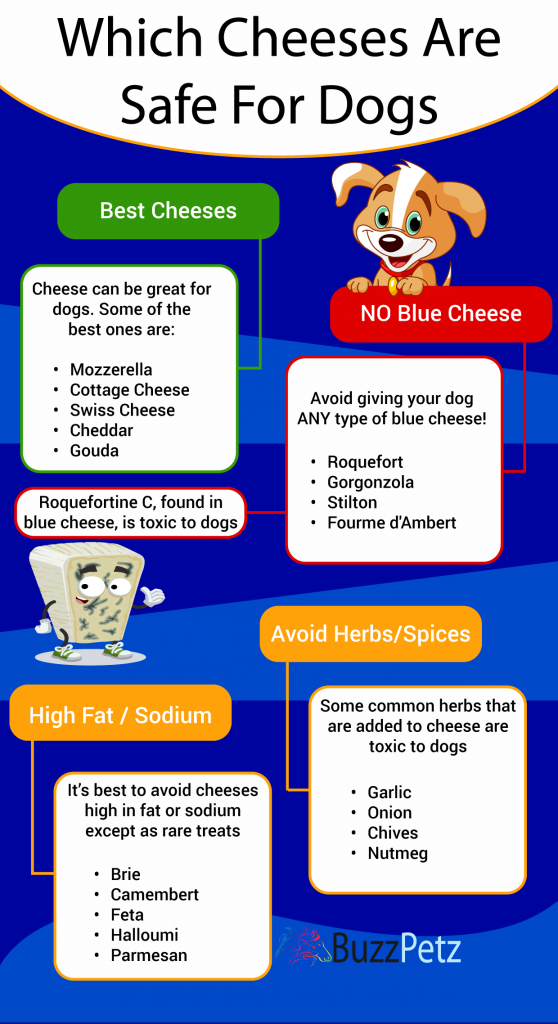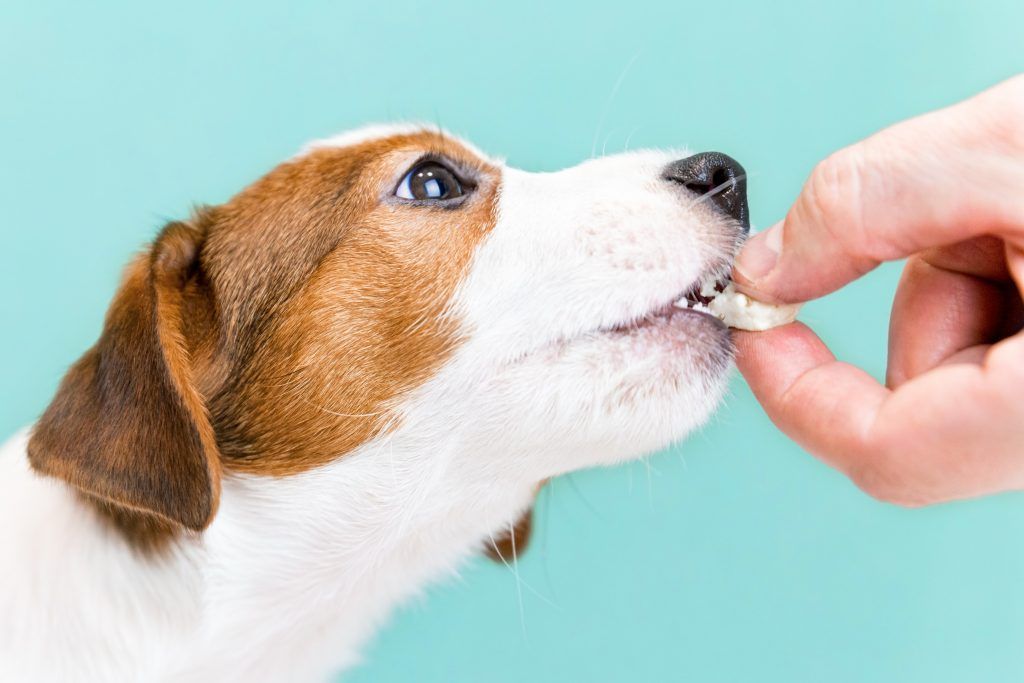Dogs go absolutely nuts for cheese, but should we be sharing it with our four-legged pals?
From using it to conceal medicine, as a high-value training treat, or our toddlers sharing their string cheese, dogs tend to get cheese frequently. But have you ever thought about whether or not it was good for them? I did.
Can dogs eat cheese? It seems like such a simple but often overlooked question.

Cheese Is a Great Treat But a Bad Diet
Cheese is a delicious and nutritious food that can provide many benefits for dogs.
But it’s not a complete or balanced diet for dogs. Like any other human food, there are some considerations when giving it to your dog.
Cheese is high in fat, calories, and sodium, which can cause problems for your dog.
Some dogs are lactose intolerant and may experience symptoms such as diarrhea, vomiting, gas, or bloating.
Cheese can also trigger allergies or intolerances in some dogs. Most commonly, if they already have a history of food sensitivities.
Benefits of Cheese
It’s well known that dairy, including cheese, has a number of good nutrients for us, and that’s no different for dogs.
Cheese is rich in calcium, phosphorus, protein, and A and B vitamins, all of which are essential for your dog’s health.

It can also help your dog’s digestion by providing probiotics along with other benefits for your dog’s health, such as:
- Boosting their immune system: Cheese contains immunoglobulins, which are antibodies that help fight infections and diseases. Cheese also contains zinc, which is an important mineral for the immune system.
- Improving their dental health: Cheese can help prevent plaque and tartar buildup on your dog’s teeth by stimulating saliva production and creating a protective layer on the enamel. Cheese also contains casein, which is a protein that helps strengthen the teeth and bones.
- Enhancing their mood: Cheese can make your dog happy by stimulating the production of serotonin, which is a neurotransmitter that regulates mood, appetite, sleep, and pain. Cheese also contains tryptophan, which is an amino acid that helps produce serotonin.
What Cheeses Are Bad For Dogs
While most cheeses are safe for dogs, not all of them are. Some cheeses can be toxic or harmful to your dog’s health.
Blue Cheese Is Toxic To Dogs
Some people enjoy the strong flavor and aroma of blue cheese, but it can be dangerous for dogs.
During production, Penicillium roqueforti is added to the cheese, which is what gives blue cheese its characteristic flavor and blue-veined color.
P. roqueforti produces a mycotoxin, known as Roquefortine C, as a byproduct.
Of course, Roquefortine C is safe for humans, but it can cause neurological symptoms in dogs, such as tremors, seizures, or death. You should never give blue cheese to your dog or let them eat any food that contains blue cheese.
There are some artisanal blue cheeses that are produced with funguses other than P. roqueforti, so they may or may not contain Roquefortine C. Since the only way to tell would be to test each individual cheese, it’s best just to keep blue cheese away from dogs.
Cheese With Added Herbs and Spices
Some cheeses have added herbs and spices to enhance their flavor or appearance. Like the herb-encrusted mozzarella, I used to get at Publix. Sadly, I can’t seem to find it anymore, but I digress.
Many of these ingredients are toxic or harmful to dogs, even though the cheese itself isn’t. For example:
- Garlic: Garlic is a common ingredient in many cheeses, such as cheddar or mozzarella. Garlic can cause hemolytic anemia in dogs, which is a condition where the red blood cells are destroyed faster than they can be replaced. Garlic can also cause gastrointestinal upset or irritation in dogs.
- Onion: Onion is another ingredient that can be found in some cheeses, such as cream cheese or cottage cheese. Onion can also cause hemolytic anemia in dogs, as well as damage to the liver or kidneys.
- Chives: Chives are a type of onion that can be used as a garnish or flavoring for some cheeses. Chives can have the same effects as onion on dogs, such as hemolytic anemia, liver or kidney damage, or gastrointestinal upset.
- Nutmeg: Nutmeg is a spice that can be used to flavor some cheeses, such as ricotta or mascarpone. Nutmeg can cause hallucinations, seizures, or death in dogs, as it contains a substance called myristicin, which is toxic to the nervous system.
You should avoid giving cheese with extra herbs/spices to your dog or check the ingredients label carefully before feeding them any cheese.
Some Cheese Isn’t Bad But Should Still Be Avoided
Some cheeses are not toxic or harmful to dogs, but they are still not recommended for them. These cheeses include:
- High-fat cheese: Cheese that is high in fat, such as brie, camembert, or cheddar, can cause pancreatitis in dogs, which is a condition where the pancreas becomes inflamed and unable to produce digestive enzymes. Pancreatitis can cause severe pain, vomiting, diarrhea, or even death in dogs. High-fat cheese can also contribute to obesity or heart disease in dogs.
- High-sodium cheese: Cheese that is high in sodium, such as feta, halloumi, or parmesan, can cause dehydration, increased thirst, increased urination, or even salt poisoning in dogs. Salt poisoning can cause neurological symptoms, such as confusion, seizures, or coma in dogs. High-sodium cheese can also worsen high blood pressure or kidney disease in dogs.
If you want to give your dog cheese like feta or cheddar periodically, you should be fine. If you want to feed them cheese more regularly, I’d pick something a little healthier for them.
Which Cheeses Are Good For Dogs
Many cheeses are safe and beneficial for dogs as long as they are given in moderation. These cheeses include:
Low-Lactose Cheese
Lactose is a type of sugar found in milk and dairy products. Some dogs are lactose intolerant, which means they cannot digest lactose properly and may experience symptoms such as diarrhea, vomiting, gas, or bloating.
Some cheeses have lower levels of lactose than others, as the lactose is broken down by bacteria during the cheese-making process. Low-lactose cheese can be easier for your dog to digest and less likely to cause adverse reactions.
Some examples of low-lactose cheese are:
- Hard cheese: Hard cheese is cheese that has been aged for a long time and has a firm texture. Hard cheese has very little lactose left in it, as most of it has been removed during the aging process. Some examples of hard cheese are cheddar, gouda, swiss, or edam.
- Cottage cheese: Cottage cheese is a type of fresh cheese that has a soft and creamy texture. Cottage cheese has low levels of lactose compared to other fresh cheeses, as it is made from curds that have been drained of most of the whey. Cottage cheese also has high levels of protein and calcium, which are good for your dog’s health.
Some cheeses like Colby Jack are very low in lactose but very high in fat. As a result, you can feed your dog Colby Jack cheese but keep their fat intake in mind when you do.
Low-Fat Cheese
Fat is an essential nutrient for dogs, but like any animal, too much fat can cause problems for them.
Low-fat cheese has less fat and calories than regular cheese but still provides protein and calcium for your dog’s health. Some examples of low-fat cheese are:
- Mozzarella: Mozzarella has low levels of fat compared to other fresh cheeses, as it is made from skimmed milk. Mozzarella also has moderate levels of lactose compared to other fresh cheeses, so it may be suitable for some dogs who are not lactose intolerant.
- Cream cheese: Cream cheese has low fat levels compared to other soft cheeses, as it is made from milk and cream separated by centrifugal force. Cream cheese also has low levels of lactose compared to other soft cheeses, so it may be suitable for some dogs who are not lactose intolerant.
How Much Cheese Is Too Much
Cheese can be a great treat for your dog, but it should not be given in excess. Cheese should make up no more than 10% of your dog’s daily calorie intake.
This means that the amount of cheese you can give to your dog depends on their size, weight, age, activity level, and health condition.
As a general rule of thumb, you can use this table to estimate how much cheese you can give to your dog based on their weight:
| Weight | Cheese |
|---|---|
| 10 lbs or less | 1/2 oz or less |
| 11-25 lbs | 1 oz or less |
| 26-50 lbs | 2 oz or less |
| 51-75 lbs | 3 oz or less |
| 76 lbs or more | 4 oz or less |
You should also monitor your dog’s reaction after giving them cheese, as some dogs may have allergies or intolerances to cheese or its ingredients.
If you notice any signs of distress, such as diarrhea, vomiting, gas, bloating, itching, or swelling, you should stop giving cheese to your dog and contact your veterinarian immediately.
What Dogs Shouldn’t Eat Cheese
Some dogs should not eat cheese at all. These dogs include:
- Dogs with lactose intolerance: Lactose intolerance can cause gastrointestinal symptoms, such as diarrhea, vomiting, gas, or bloating. Some dogs are born with lactose intolerance, while others may develop it later in life due to aging or illness. Avoid giving your dog any cheese or dairy products if they’re lactose intolerant.
- Dogs with food allergies or intolerances: Some dogs may also have anaphylactic shock, which is a life-threatening reaction that causes swelling of the throat, difficulty breathing, and loss of consciousness. If your dog has a food allergy or intolerance to cheese or any of its ingredients, you should avoid giving them any cheese or dairy products.
- Dogs with pancreatitis: Pancreatitis can be triggered by high-fat foods like cheese. If your dog has pancreatitis or a history of pancreatitis, cheese may cause more harm than good.
- Dogs with kidney disease: Kidney disease can be worsened by high-sodium foods like cheese. If your dog has kidney disease or a history of kidney disease, you should avoid giving them any cheese or salty foods.
Can Dogs Be Lactose Intolerant
One of the questions I hear most often, and one of the ones that leads to the most shock, is “Can dogs be lactose intolerant?”
Dogs can be lactose intolerant, just like humans. Some dogs are born with lactose intolerance, while others may develop it later in life due to aging or illness. The severity of lactose intolerance will vary from dog to dog. Some lactose-intolerant dogs will be able to tolerate small amounts of cheese or dairy products without any problems, while others may have severe reactions, even from a tiny bite.
The best way to determine if your dog is lactose intolerant is to consult your veterinarian. Your veterinarian can perform tests to diagnose lactose intolerance and advise you on the best diet for your dog.
You can also try giving your dog a small amount of cheese and observe their reaction. If they show any signs of distress, such as diarrhea, vomiting, gas, or bloating, you should stop giving them cheese and contact your veterinarian immediately.
Using Cheese For Dog Training

Photo Credit: Shutterstock
Cheese is a great tool for training your dog since most dogs love the taste and smell of cheese. Cheese can be used as a reward or a motivator for your dog to learn new skills or behaviors. For example:
- Teaching basic commands
- Teaching tricks
- Teaching manners
However, you should be careful when using cheese for dog training. You should follow these tips:
- Use small pieces of cheese
- Use low-fat and low-sodium cheese
- Use cheese sparingly (high value reward)
- Vary the type of cheese
























